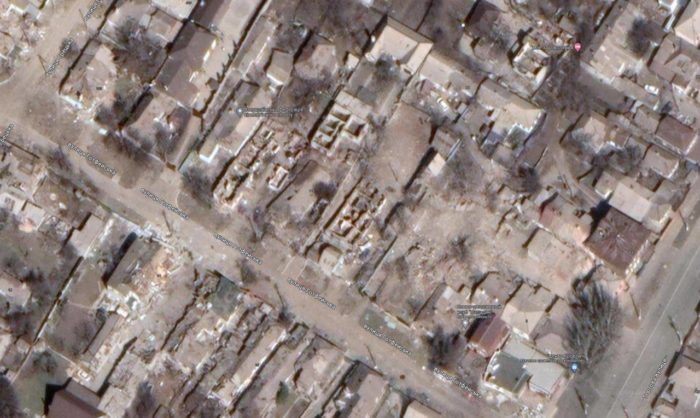German firms involved in rebuilding Russian-occupied Mariupol, Monitor investigation finds
Gaps in EU sanctions have left room for German corporate involvement in Russian efforts to rebuild destroyed and occupied Mariupol, which has propaganda value for Putin.

Several German companies, including Knauf and WKB-Systems GmbH, are supplying building materials used in the reconstruction of Mariupol, a Ukrainian city destroyed and occupied by Russia in 2022, according to an investigation by the ARD magazine Monitor.
While Russian forces destroyed Mariupol, committing war crimes at the beginning of the full-scale invasion, they later started a rebuilding program on the ruins of the occupied Ukrainian city. The reconstruction of Mariupol is one of President Vladimir Putin’s top priorities in the war against Ukraine. He personally visited the city to inspect new buildings erected swiftly by construction companies. Russian state media are promoting the rebuilding of Mariupol as a “Russian city.”
Knauf
Extensive photographic evidence and business records show building materials from Knauf, a gypsum production firm, being used at multiple Mariupol construction sites. Knauf has long-standing business ties to Russia, generating billions in revenue and still employing 4,000 people there, according to Tagesschau.
For over 20 years, Knauf’s company patriarch, Nikolaus Knauf, served as an honorary consul for Russia, captured smiling in photos near Putin. Even after Russia annexed Crimea, Knauf remained in this role, and in 2018 he characterized the ensuing sanctions against Russia as “terrible,” according to the Monitor investigation.
In a statement to Monitor, Knauf condemns the Russian invasion and says it complies with all EU sanctions, manufacturing within Russia solely for the domestic market. However, sanctions law expert Viktor Winkler calls the notion that limiting business to Russian territory ensures sanctions compliance “an absolute myth” that “could not be further from reality.” German corporate involvement in Mariupol’s reconstruction could violate EU sanctions, even though construction materials are not directly banned, Viktor Winkler tells Monitor.
WKB-Systems
The investigation also identifies the German mechanical engineering firm WKB-Systems as involved in Mariupol, with its concrete blocks used widely in the city.
Monitor states WKB’s main shareholder is Russian construction magnate Viktor Budarin, who purchased the company in 2010 to equip his factories. Customs data seen by Monitor shows WKB was supplying components to a new Budarin plant even after the war began. Though many oligarchs have been sanctioned, Budarin is not among them, which Winkler suggests highlights inconsistencies in the EU’s approach.
“The EU’s selection of which oligarch is sanctioned and which is not, to put it cautiously, so far cannot be attributed to a uniform plan, “ Viktor Winkler
War crimes in Mariupol
In February 2022, Russian forces launched a devastating assault on the Ukrainian city of Mariupol, marking the beginning of a prolonged siege that would last for several months. Mariupol was subjected to relentless bombardment, resulting in widespread destruction of civilian infrastructure, including homes, hospitals, and schools.
Reports from international organizations and media outlets reported tens of thousands of civilians killed and hundreds of thousands displaced. As Russian troops occupied the city, they sought to suppress resistance and assert control, leading to further human rights abuses and suffering among the population.
In its attempts to rebuild Mariupol, Russia has also attempts to erase the Ukrainian historical memory of the city.
Knauf and WKB Systems GmbH did not respond to the Monitor’s requests for comment on the specific nature and implications of their activities in Russia.
Related:
- Ukrainian fury as ZDF airs report normalizing life under Russia
- Russians exhibit children whose mother killed in Mariupol at Moscow propaganda concert
- “It was hell.” Civilians evacuated from Mariupol tell of survival, Russian filtration camps, and death
- Ukraine honors victims of Mariupol theater bombing by Russia, demands Russian accountability
- Russo-Ukrainian war, day 747: “20 Days in Mariupol” wins Oscar for Best Documentary


